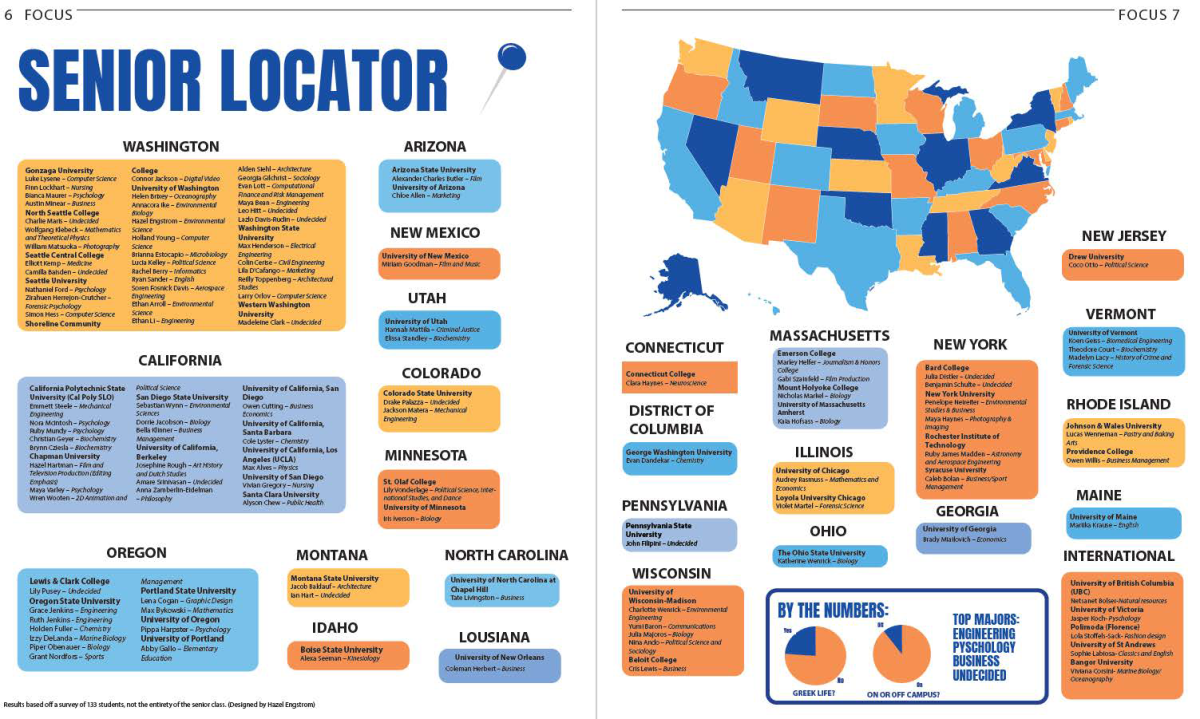Taking her l’amour du français to another level
Through a study abroad program, she experiences life as a French girl
June 22, 2023
Students have observed an increase in foreign students this year, as the exchange student program has picked up once again. Similarly, some BHS students have begun to travel abroad.
Junior Mira Slotkin, following her love of French, decided to venture on a trip to France, through the Council on International Educational Exchange (CIEE), a nonprofit international education and exchange program. She flew out in January and returned this month, once the French school year ended. She found motivation to pursue a semester abroad after hearing about her soccer teammate’s experiences.
“I was scrolling through my friend’s TikTok page,” Slotkin said. “She was like, ‘I just got back from a (10-month) year abroad in France and it was the best experience of my whole life’.”
Before the adventure began, Slotkin found herself feeling very confident, despite knowing little French, as she walked through the doors of Leon Blum in a town called VilleFranche.
“With learning over Zoom [during the pandemic], I had only had a year and a half of French before I went to live in the country,” she said. “So it didn’t feel like a lot [and] for the first week, I just said ‘yes’ to everything.”
However, Slotkin soon realized this wouldn’t be the most efficient way to improve her French.
“I wasn’t confident in myself enough to ask questions,” Slotkin said. “I thought it was undermining my own intelligence.”
Having realized the importance of asking questions, Slotkin started being more open to asking people to clarify certain things she didn’t understand, which led her towards significant growth.
“Every time I didn’t understand something, I stopped and I said, ‘can you explain this to me?’ and that ended up being my saving grace,” Slotkin said.
She describes minor differences she noticed when it came to French behavior.
“In the US we put our hands under the table when we eat,” she said. “In France, it’s rude to do that. You have to keep your hands where everyone can see them.”
Slotkin highlights the differences between French and American schools.
“In France, they don’t really have a life outside of school,” Slotkin said. “You start school at 8 am, you end school at 6 pm and then you go home and you eat dinner. That’s mostly the schedules of most French kids that I know.”
While American students are provided opportunities to partake in extracurriculars such as music or sports, from Slotkin’s experience French students aren’t.
“French students are not allowed to make the school their own,” Slotkin said. “Even though they’re there way longer than we are.”
She mentions that while schools in the U.S. have substitute teachers, French classes are canceled if the teacher is unavailable to attend.
“You’re responsible for yourself [and] how you spend your time,” Slotkin said. “Because you have a lot of it. I spent a lot reading and eating sandwiches at the cafe. ”
Slotkin also witnessed a French instinct of conserving as much energy as possible.
“You would never leave a light on when you leave a room and you turn the shower off when you’re not actively washing your hair,” Slotkin said. “So you’re conserving as much as you can [and] you don’t leave food on your plate. So that part is really great.”
Despite positive differences she noticed, Slotkin fell victim to hearing discriminatory language.
“In the US (and I know it’s not always genuine), but we act nicer to people just in public,” she said. “One thing that was super surprising to me was how much racism and anti semitism I saw in France.”
Jokes that she couldn’t handle were made at times, making her very uncomfortable.
“People would come up to me (I’m Jewish) and they would make Holocaust jokes to me, which I did not find funny,” Slotkin said. “Or like they would pull back their eyes and make no jokes about Chinese people. Or Arab people.”
She explains that despite correcting students about the harm of such statements they don’t truly understand the reason it’s harmful, especially due to the lack of cultural diversity in the rural parts of France.
“You have to confront these people who have never seen an actual Asian person in their life,” Slotkin said. “And they’ll be like, ‘you don’t understand our humor. You’re just an American. This is French humor.’”
She found herself feeling quite shocked upon hearing such statements from people who had been so genuine to her.
“It’s almost like they get that you don’t like it, but they don’t understand why they shouldn’t do it,” Slotkin said.
While social aspects in the rural town caused her much discomfort, Slotkin doesn’t allow it to be the main takeaway of her trip, as she wants to study international relations and French.
“French became kind of an obsessive thing for me,” she said. “Because you want to get so good at it.”
There were other students in the program from the US, including a student from Olympia, who was a good friend of Slotkin.
“We all tried our best to help each other in whatever ways we could,” Slotkin said. “There’s this girl from Ingram [High School] who was in my group [and] she’s actually one of my neighbors.”
She describes feeling close to home, despite being thousands of miles away, because of the support within the group.
“When you experience living in another country, you need people to rely on,” she said. “You need people who are close to your heart.”
Slotkin’s love of French has only increased during her semester abroad, and plans to go back.
“Once I really got there and I started understanding everything, French became a part of my life,” Slotkin said. “I was constantly learning French and I want to continue to pursue that.”
























